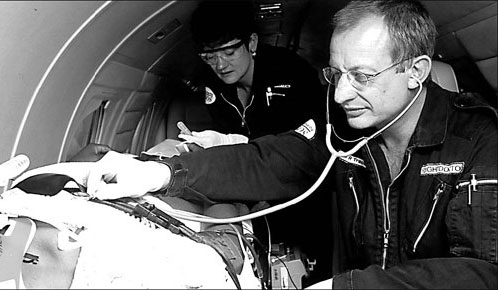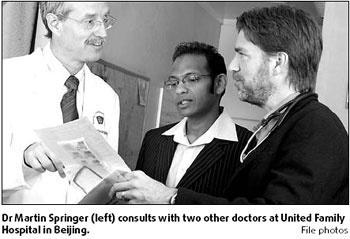Medical experts tend to a patient being evacuated by air.
A Beijing-based expatriate who becomes severely ill in Singapore may be diagnosed, treated and released after a short visit to a local doctor. On the other hand, if the person suffers chest pains in a hotel room in Tibet Autonomous Region in Southwest China, his prognosis may hang in the balance - unless he or she knows the right number to call.
The medical condition itself may not be the problem compared to the patient's geographic location, ability to speak the local language and inadequate preparation.
Foreigners who live or work in China for an extended time may not think much about planning for emergencies. Medical facilities in large cities such as Shanghai, Beijing or Guangzhou can handle most medical problems adequately. However, expats may not be able to navigate an emergency alone in isolated locations.
Preparation is the key, according to experts who specialize in helping foreigners.
John Williams, the Beijing-based managing director of International SOS in China, a private company that provides medical and security assistance, says every situation is unique. "An emergency can be as small as a cold, depending on the circumstances," Williams says.
"If somebody's appendix is getting worse and worse, an appendectomy may be needed. If the person is in Beijing, it may not be so much of an emergency than if the person was in Urumqi, for example."
Foreigners in China were understandably concerned when news stories about bird flu or SARS swamped the airwaves and took precautions.
While there are reasons to prepare for such a health emergency, Americans, Japanese or other expats should, experts say, do more to prepare for more common medical problems that could turn dangerous.
Dr. Martin Springer, chairman of emergency medicine at Beijing United Family Hospital, says emergency care in Beijing is surprisingly good for a country in its stage of development.
"It would be expected that the emphasis would not be on emergency care but rather public health measures such as vaccinations, which China reportedly does better than the United States," he says. "China reports a city wide vaccination rate of 96 percent, the United States only 80 percent."
The American Chamber of Commerce held a program to help its members prepare for medical emergencies. James Zimmerman, chairman of the chamber says there is no substitute for good information.
"Given the lack of familiarity with the resources by many foreign companies and their employees, this program is designed to help them understand the resources available in the event of an emergency," he says.
For those who tend to travel outside large cities, either for business or vacation, experts stress that medical insurance should be a priority.
Elena Makeeva, a doctor of traditional Chinese medicine who works at International SOS as a marketing manager, says the company's clients in China are expatriates, employees of Fortune 500 and 100 corporations and an increasing number of Chinese patients.
"Communication with local doctors, with local medical staff, this is the biggest difficulty," she says.
While International SOS is not a hospital, it does have alarm centers and clinics staffed with doctors who can make a diagnosis and recommend more urgent attention including evacuation.
"Just imagine the picture, people go to Tibet, something goes wrong there, it may be altitude sickness, it may be severe enteritis due to different hygiene levels or food preparation," says Makeeva.
If the client calls any one of the company's Chinese alarm centers, they can speak to a doctor in English or in another language for medical advice.
The result can be drastic action such an air evacuation back to Beijing, the nearest large city or to their home country, she says. Last year, the Beijing alarm center handled 527 medical evacuations, most being air evacuations, Makeeva says.
The company has its own dedicated airplane based in Beijing and also uses commercial jets.
In the most extreme situation, a person who is in a remote part of China and needs evacuation may ask International SOS to call on the Chinese military for help.
Williams says the last time the company had to call in the military was in 2000 when Black Hawk helicopters from the Chengdu military region near Tibet were used because of the remote location. He says improved road conditions over the years have reduced the reliance on such air rescues.
In Beijing, while most ambulances have defibrillators, the average response time in Beijing is about 13 minutes, the emergency telephone line 120 reported, according to Springer.
Health officials plan to slash that time to five minutes by the Olympics. However, this may not be the case outside of the city in places such as Shunyi.
Springer says a 13-minute response is too slow to treat a cardiac arrest, anaphylaxis or drowning patient. He suggests that expats learn Cardiopulmonary Resuscitation (CPR). CPR and obtain access to automatic defibrillators (AEDs) that any ordinary person can use. He says housing complexes and work places should lead the way.
"If one of these deaths is treated properly with CPR and an AED before the ambulance gets there, the chance of survival is much greater," he says.
He suggests that expats carry a debit card at all times that could be used in China although the withdrawal limit might not be enough for most emergencies.
One option, he says, is that foreigners could dial the emergency number at his hospital for English language assistance.
The hospital, which has a direct line to 120 and 999 ambulance systems, could offer advice on how to handle an emergency and how to proceed.
He and other experts say expats tend to forget a few basic safety precautions.
For example, bicycle helmets and seat belts in cars could reduce injuries but many people don't wear them while riding.
(China Daily October 12, 2007)



